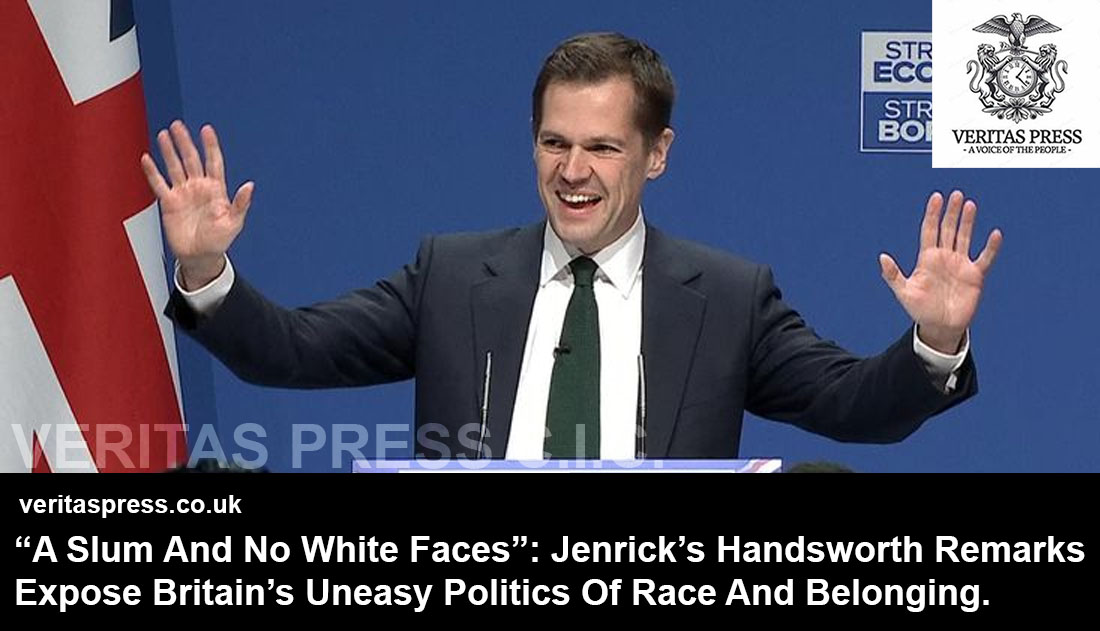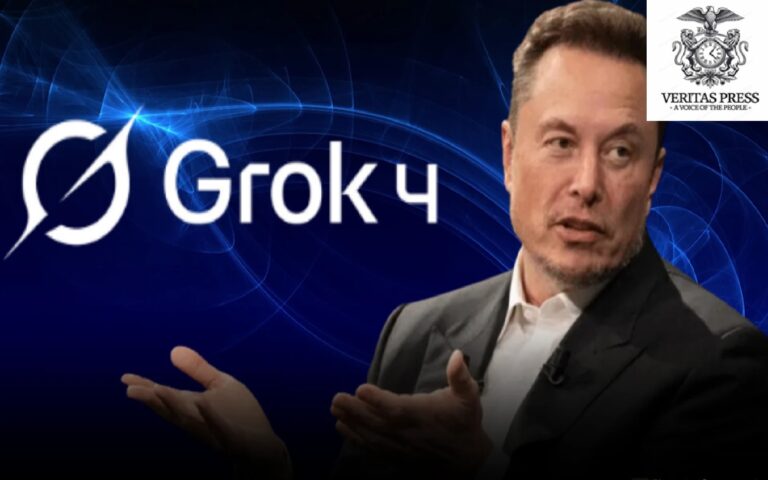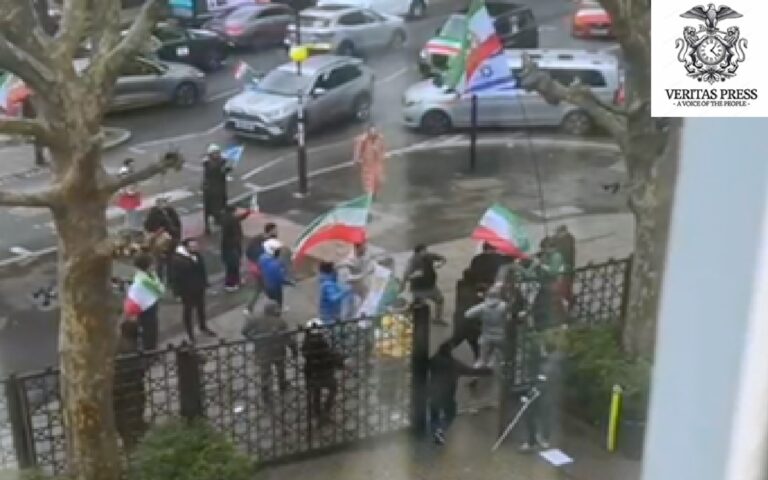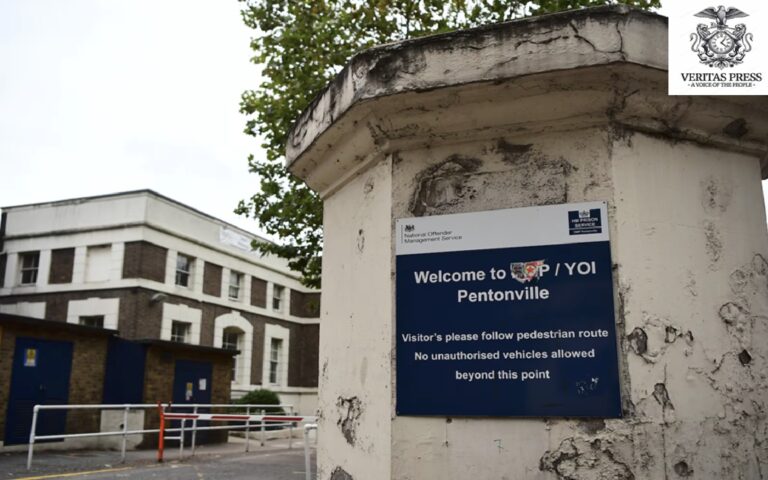Press Release: Veritas Press C.I.C.
Author: Kamran Faqir
Article Date Published: 07 Oct 2025 at 15:59 GMT
Category: UK | Politics | Robert Jenrick’s remarks
Source(s): Veritas Press C.I.C. | Multi News Agencies

Business Ads


The Bishop of Birmingham has condemned Robert Jenrick’s remarks about the city’s Handsworth district as “entirely wrong” and “deeply unhelpful,” warning that such rhetoric risks stoking division and fuelling a “fire of toxic nationalism.”
Jenrick, the Shadow Justice Secretary and one of the Conservative Party’s rising figures, is under mounting pressure after a leaked recording revealed he described Handsworth as “as close as I’ve come to a slum in this country” and said he “didn’t see another white face” during a 90-minute visit earlier this year.
The comments, first reported by The Guardian, have reignited Britain’s long-simmering debate over race, class, and integration, and exposed a widening rift within the Conservative Party over how to speak about multiculturalism in post-Brexit Britain. Furthermore, this is a clear illustration of the conservative party’s disconnect from multicultural communities and their concerns.
“He Came Here to Film Rubbish, Not to Listen”
Jenrick’s remarks were made at a Conservative Association dinner in Aldridge-Brownhills in March, shortly after filming a social media video about Birmingham’s bin strike. His footage, showing littered streets, was meant to criticise Labour-run Birmingham City Council, then mired in financial crisis and industrial disputes.
But for Handsworth residents, the MP’s description of their area as a “slum” was seen as an insult rather than an observation.
“He came here to film rubbish, not to listen to people,” said Aisha Rafiq, who runs a youth centre off Grove Lane. “If he’d stayed longer, he’d have seen the Caribbean bakery across the road, the gurdwara down the street, the mosque that runs food drives every week. This community looks after itself when the government doesn’t.”
In Handsworth’s busy Soho Road, where halal butchers stand next to Caribbean takeaways and Indian jewellery shops, many residents said Jenrick’s words felt like a deliberate provocation.
“Calling us a slum? That’s outrageous,” said Gurpreet Singh, who manages a local convenience store. “We’ve had Conservative politicians ignore this area for years, and now they suddenly care, but only to insult us. It’s like they need to show voters they’re tough on multiculturalism.”
“If there are problems here, they come from neglect, not colour,” added Leanne Gordon, a social worker whose family has lived in Handsworth since the 1970s. “Our schools are underfunded, youth services are gone, and bins go uncollected. Don’t blame integration for poverty.”
Faith Leaders And Officials Push Back:
The Right Reverend Michael Volland, Bishop of Birmingham, wrote directly to Jenrick, warning that his words risked “stirring up division” and “feeding the fire of toxic nationalism.”
“Your comments have the potential to cause deep harm and anxiety,” he said. “They misrepresent the communities that make Birmingham what it is: resilient, diverse, and proud.”
Former Conservative West Midlands Mayor Andy Street said Jenrick was “plainly wrong,” describing Handsworth as “a thriving, mixed community where faiths and ethnicities work side by side.”
“When you walk through Handsworth, you see Sikhs, Muslims, Hindus, Christians, and white Brummies too,” Street told BBC Newsnight. “It’s one of the most integrated places I know, not the opposite.”
Street’s successor, Labour’s Richard Parker, accused Jenrick of using Birmingham “as a political prop.”
“What’s worse,” he said, “is that other Conservatives in that room said nothing. That silence tells you everything about the kind of politics now being rewarded in the party.”
The Defence: “Just an Observation”.
Jenrick and his allies have refused to apologise. Speaking on The Telegraph’s Daily T podcast, he doubled down:
“It did look like a slum. There wasn’t a mix of people on the streets. I was describing what I saw. We can’t shy away from difficult truths about integration.”
Party leader Kemi Badenoch backed him, saying there was “nothing wrong with making observations.” At the Conservative Party conference in Manchester, she claimed critics were trying to “police speech.”
“We can’t fix integration if we can’t even describe what we see,” she said.
Badenoch, who has accused “sectarian MPs in Birmingham” of focusing more on Gaza than local issues, has become a prominent voice of the party’s nationalist wing, one that frames cultural cohesion and “British values” as central to its identity.
Beyond Observation: A Pattern Of Rhetoric.
But critics say Jenrick’s comments fit a broader pattern: weaponising the language of “integration” to signal racial and cultural anxiety to white voters.
Earlier this year, he claimed that the white British population in parts of Dagenham had “halved in 25 years”, suggesting it was a warning sign. When pressed on why that mattered, he insisted it was about “social cohesion.”
Dr. Kehinde Andrews, professor of Black Studies at Birmingham City University, said Jenrick’s description of Handsworth reveals “a colonial gaze that sees whiteness as civilisation.”
“Calling a place with brown and Black faces a ‘slum’ is not an observation, it’s a judgement,” he said. “He’s describing diversity itself as decay. That’s the old racist logic of empire dressed up as concern for community.”
Andrews argues that Handsworth, and areas like it, have long been used as rhetorical battlefields where politicians project the failures of the state onto racialised communities.
“When white working-class areas face neglect, politicians talk about ‘levelling up’. When Black or South Asian areas do, they talk about ‘integration’. The difference is political, not factual.”
Integration Or Instrumentalisation?
Experts say that invoking “integration” has become a political code, a way of discussing immigration, culture, and belonging without mentioning race explicitly.
Dr. Sunder Katwala, director of the think tank British Future, said Jenrick’s phrasing, especially “not seeing another white face”, was “loaded with implication.”
“It’s not that we can’t talk about cohesion,” Katwala told Sky News. “It’s that we have to be clear about what we mean. If we’re measuring integration by the colour of faces on the street, then we’ve already lost the argument.”
For many in Birmingham, this latest controversy feels less about policy and more about power, about who gets to define what “Britishness” looks like.
Handsworth’s Reality: Pride and Poverty
Handsworth has long been a symbol of both struggle and solidarity. In the 1980s, it saw unrest driven by police racism and economic deprivation, but also produced cultural icons, from Steel Pulse to Benjamin Zephaniah.
Today, it remains one of Birmingham’s most diverse areas: around 90% of residents are from minority backgrounds. Poverty levels are high, but so is community engagement, with food banks, youth clubs, and interfaith initiatives filling the gaps left by austerity.
At the Handsworth Association of Schools, coordinator Marcia Walker said she was “tired of politicians flying in for soundbites.”
“We’ve been working for years to bring young people of all backgrounds together. Jenrick didn’t come to see that. He came to film bin bags.”
Outside a bustling Somali café, Mohamed Abdi, a taxi driver who has lived in Handsworth for two decades, said:
“People like him never come here to talk about housing or schools. They just want to make headlines. When they say ‘integration,’ they mean obedience, not understanding.”
A Mirror To Britain:
The political storm around Jenrick’s remarks reflects a broader national tension: how a changing Britain talks about itself. Census data shows that by 2040, ethnic minorities will make up one-third of England’s population. Yet the political conversation around multiculturalism often remains framed through anxiety and loss.
Dr. Maya Goodfellow, author of Hostile Environment: How Immigrants Became Scapegoats, says politicians like Jenrick “exploit a language of decline.”
“They describe multicultural cities as broken or failed, but what’s actually broken is Britain’s social contract,” she said. “When communities are denied investment, jobs, and decent housing, it’s easy to point the finger at colour rather than class.”
The Reckoning Ahead:
While Kemi Badenoch’s defence has shielded Jenrick from disciplinary action, the controversy exposes a deep fault line within the Conservative Party. One camp sees Britain’s diversity as an asset to celebrate; another frames it as a challenge to manage.
For communities like Handsworth, the stakes are clear.
“We’re used to being spoken about, not spoken to,” said Aisha Rafiq. “But the truth is, Handsworth represents the future of this country, multifaith, multilingual, multiethnic. If that makes some politicians uncomfortable, maybe it says more about them than about us.”
Britain’s Conversation About Itself:
What began as a stray remark at a dinner has become a mirror reflecting Britain’s anxieties about who belongs and who defines belonging.
As the Bishop of Birmingham put it:
“We must ask whether this rhetoric contributes to unity, or deepens the divides that already exist.”
For Handsworth, a place where curry houses sit beside Pentecostal churches and reggae blares from passing cars, that answer seems clear.
“We’ve lived together for decades,” said Gurpreet Singh, standing behind his shop counter.
Handsworth has long been a mirror of Britain, resilient, diverse, and alive with stories of migration, faith, and working-class pride. To reduce it to a “slum” is to erase the generations who built it, who kept its streets alive even as austerity stripped its services bare. The truth is, Handsworth didn’t fall into neglect because of who lives there, but because of who governs from afar.
If politicians are sincere about integration, they might start by integrating compassion with policy, truth with rhetoric. Because the question that now hangs over this controversy is not whether Handsworth belongs to Britain, but whether Britain’s leaders still recognise themselves in the country they claim to represent.
“If That’s Not Integration, I Don’t Know What Is”





























